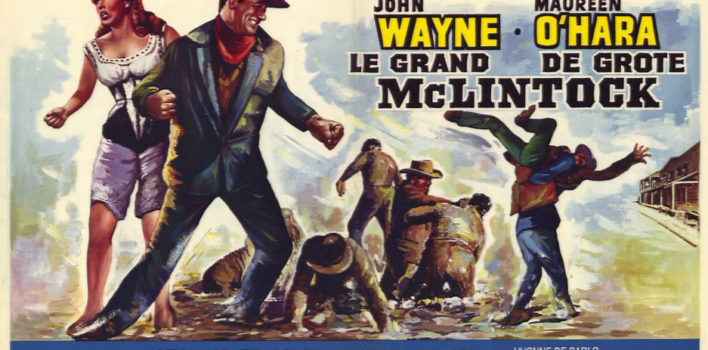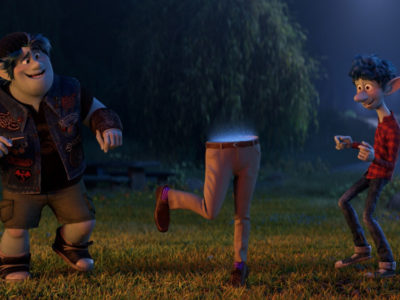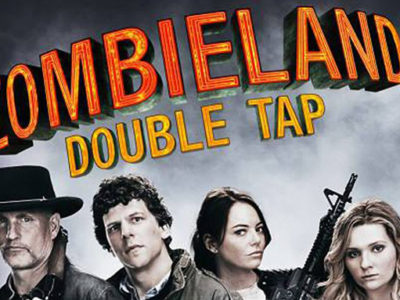Reviewing the Classics| McLintock!
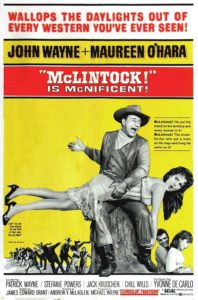 One of the unfortunate casualties of the current cultural climate is our inability to laugh at ourselves and the absurdities of life without feeling guilty or uncomfortable. “In good humor” is a phrase met with suspicion and derision by people with little to no sense of humor. And certain classics – be they film, literature, and other art forms – are chided for their “insensitivity” and cast into the netherworld of obscurity – no matter what truth about humanity they may or may not have brilliantly conveyed.
One of the unfortunate casualties of the current cultural climate is our inability to laugh at ourselves and the absurdities of life without feeling guilty or uncomfortable. “In good humor” is a phrase met with suspicion and derision by people with little to no sense of humor. And certain classics – be they film, literature, and other art forms – are chided for their “insensitivity” and cast into the netherworld of obscurity – no matter what truth about humanity they may or may not have brilliantly conveyed.
Such is the case with McLintock!, the 1963 comedy/western film starring screen legends John Wayne and Maureen O’Hara. It’s one of my favorite of Wayne’s films – right up there with The Searchers in terms of quality entertainment. However, a film like this, with its broad humor and stereotyping, could never be made today, lest it is met with protests and condemnations from academia, government, and other corners of the professional protest industry.
Set near the end of the 1800s, John Wayne plays cattle baron George Washington “G.W.” McLintock – a man who seemingly has everything (at least to those outside of his inner circle) and engenders all sorts of jealousy from lesser men young and old. But when his estranged wife Katie (O’Hara) returns after two years away, G.W. hides his hurt by locking horns with her, and Katie is more than eager to dig her heels in the sand. What follows is a story inspired by William Shakespeare’s The Taming of the Shrew – complete with back-and-forth manipulations and a classic battle of wills.
An Unconventional Western
McLintock! is not a typical John Wayne western. It doesn’t take itself very seriously in tone and realism as there is plenty of hilarious slapstick and exaggerated sight gags. The film has a wholesome, “aw shucks” quality to it that is very charming.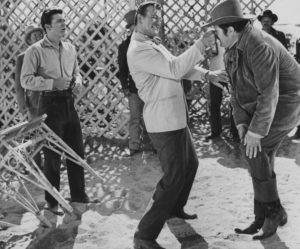
The cast is wonderful. The ease in which they play off each other makes it clear they had a great time making the film. Several of the players were part of Wayne’s stock company of friend actors (like Chill Wills and Hank Worden), and their history together really brought out a sense of history with the characters.
John Wayne himself is brilliant is the film, balancing his trademark swagger and confidence with stubborn buffoonery. Anyone who thinks that Wayne was a terrible actor should really see this film and watch as he easily goes from serious to farcical – sometimes in the same scene!
There’s plenty of farce to go around in McLintock! Like Mel Brooks’ Blazing Saddles, the film pokes fun at aspects of the western genre, even Wayne himself. It’s almost as if Wayne was making light of his own rugged persona – showing, in a humorous fashion, the downside of the overly-macho bravado that sometimes turns men into obtuse apes. There is stereotyping, but it isn’t malicious in context and it is equal opportunity. For example, during the mud-soaked melee (one of the film’s many comedic highlights), the Native Americans look on in bewildered amusement as the white settlers pummel each other.
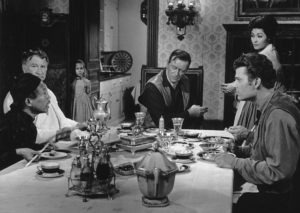 In a way, McLintock! shares some of its tone and message with The Searchers. Both are brilliantly subversive tales of the American West, picking apart tropes of the genre to create something more profound. But where The Searchers was more serious in its approach, McLintock! engages comedically through hyperbole. Not in the broad in-your-face farce of Brooks’ 1974 masterpiece, but as a screwball comedy dressed up as a western.
In a way, McLintock! shares some of its tone and message with The Searchers. Both are brilliantly subversive tales of the American West, picking apart tropes of the genre to create something more profound. But where The Searchers was more serious in its approach, McLintock! engages comedically through hyperbole. Not in the broad in-your-face farce of Brooks’ 1974 masterpiece, but as a screwball comedy dressed up as a western.
The film comments about the evolution of the west from a wild country to one tamed by the government, and how that comes with consequences both good and bad. The characters often lament to each other about just how much is changing, reminiscing about times in their youth when they rode freely through the plains, fighting Indians as well as the frontier itself. While the peace with the Indians is welcomed, G.W. is wary of what the “benevolent” government will bring to the wild territory: bureaucracy, red tape, and a lot of “nincompoops” running things.
G.W. McLintock may be a rich cattle baron, but he’s not the kind scorned by many a modern culture critic. This is not the overly-stereotyped greedy, uncaring white bigot. He pays his men fairly for a fair day’s work and isn’t without understanding and compassion (uncoerced by the government, I might add). He’s a friend to the Native Americans, happy to give them shelter and food, protect them from the homicidal hysterics of a settler mob, and defend them with respect and reverence at unsympathetic government hearings. And he intends to leave most of his acreage to the nation when he dies to make sure that the natural beauty will be safe from development.
Love in the Country
“Half the people in the world are women. Why does it have to be you that stirs me?”
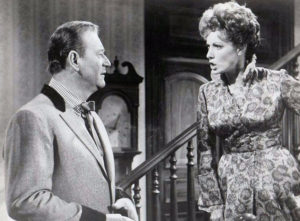 John Wayne and Maureen O’Hara were the screen couple, period. Never has there been a couple with more chemistry that was constantly palpable on screen. With her trademark fire and feminine confidence, O’Hara was the was the only woman who could believably go toe-to-toe with the larger-than-life Duke. Wayne and O’Hara made five films together, each one elevated by their stunning chemistry. McLintock! is my favorite of their films (though The Quiet Man is a very close second). Their squabbles and dialogue exchanges have so much biting emotional subtext to them.
John Wayne and Maureen O’Hara were the screen couple, period. Never has there been a couple with more chemistry that was constantly palpable on screen. With her trademark fire and feminine confidence, O’Hara was the was the only woman who could believably go toe-to-toe with the larger-than-life Duke. Wayne and O’Hara made five films together, each one elevated by their stunning chemistry. McLintock! is my favorite of their films (though The Quiet Man is a very close second). Their squabbles and dialogue exchanges have so much biting emotional subtext to them.
The romantic standoff between G.W. and Katie is one of stubbornness, misunderstanding, and will. It’s obvious that they both still care for each other despite their words to the contrary. They’re both very flawed and there’s plenty of blame to go around. G.W. hides his frustration and heartache under a veil of alcohol and regressive bachelor living, retreating at the inkling of serious conversations with his wife. Meanwhile, Katie has become a preening snob, preferring to be called “Katherine” by people she’s known for years, looks down upon her frontier past, makes life miserable for everyone around her, and is unable to forgive G.W. for his purported philandering (which is never really established as having actually happened).
Despite his problems with Katie, G.W. still reveres marriage and doesn’t even consider Katie’s request for a divorce. This is further illustrated with G.W.’s tender talk with his daughter, Becky (played with spunk by Stefanie Powers). He reveals that the real motive for giving most of his land to the state is more for his daughter’s sake than the nation’s, which to him is more important. He tells Becky that she won’t inherit his entire fortune because he wants Becky and her future husband to depend on each other for love and support, just as he had done with Katie when they first started out.
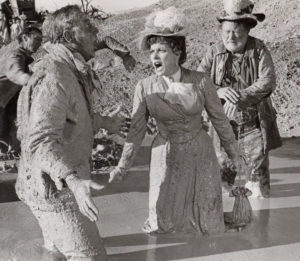 G.W. understands the importance of the male/female dynamic in a marriage, telling Becky that “all the gold in the United States Treasury and all the harp music in heaven can’t equal what happens between a man and a woman with all that growin’ together.”
G.W. understands the importance of the male/female dynamic in a marriage, telling Becky that “all the gold in the United States Treasury and all the harp music in heaven can’t equal what happens between a man and a woman with all that growin’ together.”
Men and women are made to make one another better. Women and family make men settle down and become responsible husbands, fathers, providers, and protectors. Men give women a safe place to put down roots and become their husband’s main source of encouragement and strength. They need to work together to raise children, with each contributing a different aspect to child-rearing. And both sexes become more selfless and sacrificial in the process, making both more like Christ in temperament.
In the Book of Genesis, it’s written that God created women to be man’s companion – not his slave nor his overseer, but someone he could share his life with and depend upon with the same expected on him from her. It’s very poetic that God made Eve from Adam’s rib, as illustrated by Welsh theologian Matthew Henry several centuries ago:
“The woman was made of a rib out of the side of Adam; not made out of his head to rule over him, nor out of his feet to be trampled upon by him, but out of his side to be equal with him, under his arm to be protected, and near his heart to be beloved.”
God created men and women to complement one another. That is why “a man must leave his father and mother and be united to his wife, and they become one flesh.” (Genesis 2:24) Throughout the running of the film, Katie and G.W. make a terrific team when they are actually thinking about the other person. In fact, Katie jumped into the mud fight to defend her husband without a second thought.
The Final Word
McLintock! is a film that should not be dismissed as an antiquated John Wayne western in our overly-sensitive, politically correct culture. It’s very different from almost everything Wayne made throughout his career. The film is a fun and subversive frolic through western tropes. John Wayne and Maureen O’Hara fill the screen with an entertaining electricity in every scene they’re in.
What many people might miss in their smug, “woke” dismissal of this classic film is that within its humor is an insightful look into the relationship between men and women. The modern culture at large may deny it, but men and women are different, serving complimentary purposes in life. And those differences were put there for a reason by the One who created us. Husbands and wives in marriage are a pale reflection of the love God has for us. And it’s up to us to love our spouses just as much as He loves all of us.


